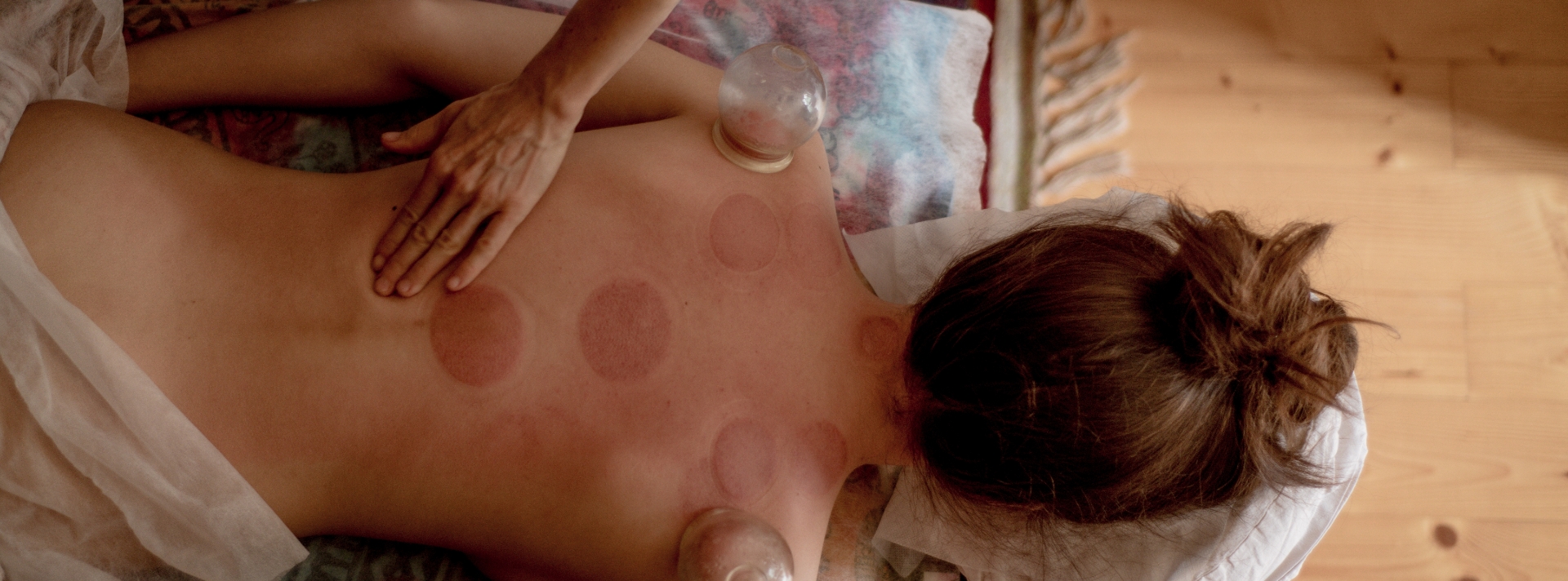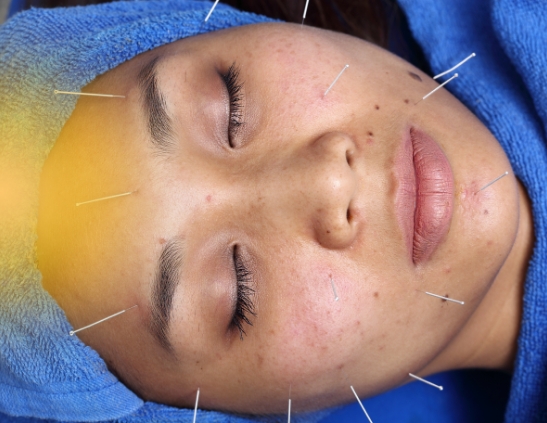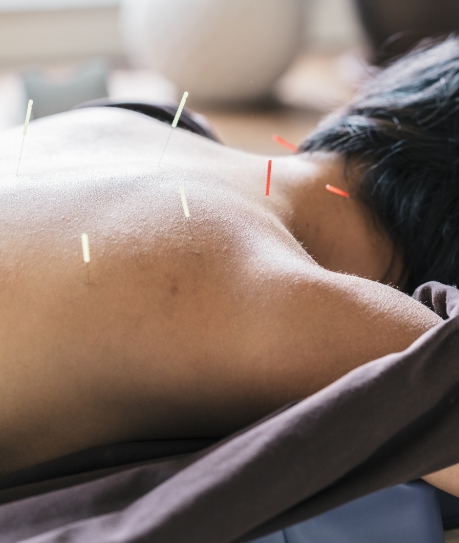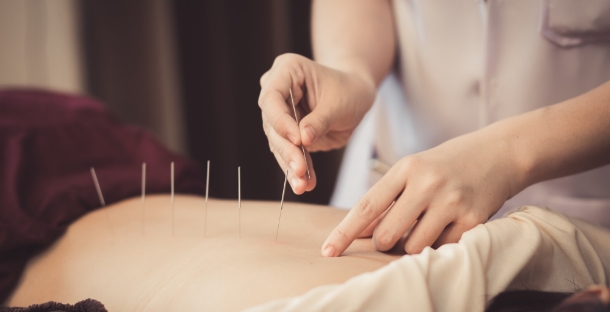
Women’s Health
Women’s health encompasses reproductive health, pregnancy, menstruation, perimenopause, and menopause. With each of the stages of women’s health, there are unavoidable symptoms, as well as increased health risks that can impact daily life. Because women’s bodies go through so many changes throughout their lives, it is important to treat and manage the accompanying symptoms. We are often told these symptoms are a fact of life, but that doesn’t have to be the case.
Acupuncture to support women’s health

Often, birth control medication is used as a one-size-fits-all treatment for a variety of women’s health issues. This can leave women feeling dismissed or unheard, not to mention burdened with a different set of side effects and health risks. Acupuncture takes a different approach, treating your body holistically to manage and reduce your symptoms.
Acupuncture restores balance in your body. It does this by ensuring energy, known as Qi, is able to flow freely through your meridians. This can improve blood flow and balance your hormones, which in turn reduces stress levels, decreases the frequency and severity of your symptoms, and promotes an overall sense of wellbeing.
Conditions and Symptoms
Every woman faces their own unique challenges in their health. Traditional Chinese Medicine has devoted much study to the treatment and management of women’s health. The following are some of the most common issues women seek out treatment for.
Acupuncture restores balance in your body. It does this by ensuring energy, known as Qi, is able to flow freely through your meridians. This can improve blood flow and balance your hormones, which in turn reduces stress levels, decreases the frequency and severity of your symptoms, and promotes an overall sense of wellbeing.
Fertility
Fertility is the ability to conceive children. There is a set period of time where women are fertile. This is because women are born with all the eggs they will ever produce. Certain medical conditions like endometriosis, PCOS, or ovarian cysts can impair or reduce fertility.

Infertility
Infertility is diagnosed as being unable to become pregnant after a year of trying for those under the age of 35, and six months of trying for those over 35. There are a variety of things that can cause infertility in women, from conditions like endometriosis and ovarian cysts to damaged or blocked fallopian tubes, or polycystic ovary syndrome. Many who struggle with infertility won’t experience any symptoms other than difficulty getting or staying pregnant.
IVF support
In vitro fertilization (IVF) is a fertility treatment that involves taking both oral and injectable hormone medication to facilitate egg follicle production and create the ideal uterine environment to support pregnancy. The added hormones and the egg retrieval procedure are both hard on the body. Many women will seek out complimentary therapies like acupuncture to help relieve stress and support fertility.
Pregnancy
Pregnancy is the roughly 38-week period in which a fertilized egg develops into a baby. During that time, your body will go through many changes as you support and nurture the development of this new life. As your body is working double time, there are several symptoms and conditions that might crop up during your pregnancy.
Morning sickness
Morning sickness is probably the most famous symptom of pregnancy. It’s a persistent nausea and vomiting that many women experience during pregnancy. Despite its name, morning sickness is experienced at any time of day, but it typically doesn’t persist past the first trimester. Although, some women may experience it through their whole pregnancy.
Edema during pregnancy
Edema is the medical term for swelling caused by fluid collecting in your body’s tissues. Women commonly experience edema in their feet and ankles during the second and third trimester of pregnancy. During pregnancy your bodies water content will increase by 6.5 litres. This water is vital to the growing fetus, placenta, amniotic fluid, and maternal blood volume. As your uterus expands, it puts pressure on the pelvic veins and your vena cava, which means blood can’t move as freely from your lower limbs back up to your heart. This results in swelling.
Pregnancy-related anxiety
Anxiety disorders are the most common mental health conditions, affecting one in five adults. As pregnancy represents both a major commitment and change in your life, it is understandable to experience some anxiety. It’s common to experience anxiety during pregnancy, but for many women, they may only experience it starting in the hours after giving birth, when they stop breast feeding, or once menses resume.
Dizziness
Dizziness is a symptom that can occur at any stage of pregnancy. While it can be caused by relatively harmless conditions, it may also be a symptom of more serious conditions. It’s important that you report any dizziness with your doctor. The simpler causes of dizziness are changes in hormones and blood pressure, dehydration, or anemia. More severe causes include hyperemesis gravidarum resulting from morning sickness, pressure on your uterus, or gestational diabetes.
Urinary retention
Urinary or bladder retention is the inability to fully empty your bladder. It can be either acute or chronic. Acute urinary retention can come on suddenly and requires immediate medical attention. Chronic urinary retention, on the other hand, will happen more slowly. Your urine stream will be weaker than normal, coming in fits and starts, and you may still feel the need to pee after you finish. This condition results from interference in the signals between brain and bladder, weakened muscles, or any kind of blockage.
Constipation and hemorrhoids
Both constipation and hemorrhoids are common during the later stages of pregnancy. This is because as your uterus grows in size, it puts more and more pressure on your lower digestive tract. As a result, bowel movements become more difficult, leaving you feeling constipated. There is also increased blood flow to the pelvis, which increases the likelihood of hemorrhoids.
Postpartum ailments
The postpartum period is the recovery time after giving birth when your body heals and returns to near its pre-pregnancy state. On average, postpartum lasts six-to-eight weeks, although some women may take longer to heal. During this time, you may experience a number of conditions that can complicate healing. Along with physical healing, postpartum comes with an emotional adjustment to the realities of caring for a new life and to the ways a baby changes how your family functions as a unit.
Postpartum depression
It’s normal to feel strong emotions after birth. For some women, this takes the form of postpartum depression. This is a form of depression that develops in the first weeks after giving birth but can start earlier than that. Symptoms will mirror those of clinical depression, while also including difficulty bonding with your baby, fear of not being a good mother, or intrusive thoughts relating to harming yourself or your baby. Postpartum depression is a serious condition that can interfere with your ability to care for your baby or perform daily activities. If you are experiencing postpartum depression, it is important that you seek care.
Abdominal pain
Abdominal pain, sometimes referred to as afterpains, is often attributed to the uterus returning to its normal size. This can feel similar to menstrual cramps as the organ contracts. It can take up to six weeks for your uterus to return to its normal size. Another common cause of postpartum abdominal pain is constipation that results from hormonal changes, stress, reduced physical activity after delivery, or a bruised perineum from labour. Lastly, women who have c-section deliveries may experience pain and cramping around the incision site as they heal.
Persistent lochia
Lochia is vaginal discharge experienced after birth, which consists of blood, mucus, uterine tissue, and other materials from your uterus. Persistent lochia, or postpartum bleeding, is a normal process of clearing out the afterbirth from your uterus as it returns to its normal size. It can last a few weeks, moving through three distinct stages as lochia is discharged. If you experience sudden or prolonged heavy bleeding that lasts more than three-to-four days after giving birth, this may be postpartum hemorrhaging and you should seek immediate medical attention.
Lochiostasis
Lochiostasis, or lochia retention, is a condition where the lochia is not discharged vaginally as expected. This can lead to lochiometra, a condition where the uterus becomes distended and pushed out of shape.
Low milk supply
It’s often taken for granted that mothers will produce more than enough breast milk for their baby, but that’s not always the case. Low milk supply can be the result of complications during delivery, postpartum hemorrhaging, thyroid conditions, PCOS, diabetes, or past breast surgery. Lifestyle factors like weight, smoking, or alcohol consumption have also been known to contribute to low breast milk production.
Painful urination syndrome
Pain with urination is not uncommon during the first six weeks after giving birth, particularly among women who’ve had vaginal births. There are a number of causes from swelling or tearing in the vaginal region, tears near or in the opening of your urethra, trauma to the urethra from a Foley catheter, to urinary tract infections.
Polycystic ovary syndrome (PCOS)
Polycystic ovary syndrome (PCOS) is a metabolic and endocrine disorder that results in irregular menstruation, hyperandrogenism, and numerous small cysts that form on the ovaries. Women with PCOS often experience weight gain, hair growth, and acne, as well as irregular or missed periods, and infertility.
Endometriosis
Endometriosis is a condition where uterine cells grow in the abdominal cavity outside the uterus. It’s characterized by excessive menstrual bleeding, heavy cramping, and longer than standard periods. In severe cases, endometriosis can cause damage to the reproductive organs, reducing fertility.
Premenstrual syndrome (PMS)
PSM, or premenstrual syndrome, is a combination of physical and emotional symptoms experienced in the one- to two-weeks leading up to menstruation. These symptoms include mood swings, tender or sore breasts, food cravings, fatigue, and irritability.
Premenstrual dysphoric disorder (PMDD)
Premenstrual dysphoric disorder (PMDD) is a more extreme form of PMS that comes with all the same physical symptoms, but also causes severe anxiety, depression, and mood changes in the days leading up to menstruation. Some who experience PMDD may become suicidal.
Menstruation
Menstruation is the final stage of the menstrual cycle when falling progesterone levels trigger the shedding of the uterine lining. This period typically lasts up to five days, during which many women experience cramping, bloating, nausea, headaches, fatigue, and irritability.
Painful periods (Dysmenorrhea)
Dysmenorrhea is a condition where women experience severe and frequent cramps during their period. It’s caused by abnormal contractions of the uterus (typically when contractions are less than ten minutes apart), which occurs either due to a chemical imbalance in the body or because of a secondary medical condition like endometriosis or uterine fibroids.
Absence of menstruation (amenorrhea)
Amenorrhea is characterized as not receiving your first period by age 15 or missing three or more periods once you’ve begun menstruating. It can be caused by a variety of things from lifestyle factors such as low body weight, excessive exercise, or stress, to hormone imbalances caused by PCOS, thyroid malfunction, or premature menopause. Women who have given birth will typically experience amenorrhea for the duration they are breastfeeding.
Heavy or prolonged bleeding (Menorrhagia)
Menorrhagia is excessive or prolonged bleeding during menstruation. Women who experience menorrhagia will commonly go through sanitary products quickly, often needing to double up, and will bleed for longer than a week. Other symptoms include anemia, tiredness, fatigue, and the inability to complete certain daily activities because of heavy bleeding.
Irregular periods
A period is considered irregular if the time between each period is not consistent, you lose more or less blood than usual, or the number of days your period lasts varies a lot. The most common cause is changes in your hormone levels. This can occur when you get a hormonal intrauterine device, start or change birth control medication, exercise too much, develop PCOS, or have recently been pregnant.
Mood swings
Mood swings occur before and during menstruation as a result in the dip in oestrogen levels. This dip can cause levels of serotonin in your brain to drop, which will result in more depressed moods.
Vaginal itching
Itching in the vagina and vulva can be particularly uncomfortable given how sensitive those areas are. Many things can cause vaginal itching, burning, or irritation. In particular, bacterial vaginosis, sexually transmitted infections (STIs), yeast infections, menopause, and chemical irritants like soaps and detergents.
Uterine prolapse
Uterine prolapse is a condition where your uterus has dropped down into your vaginal canal. This occurs when your pelvic floor, the muscles and tendons that hold your uterus in place, has weakened. Symptoms may include urine leakage, inability to fully empty your bladder, feeling of heaviness or achiness in your pelvis, bulging in your vagina, lower-back pain, and constipation. Women who’ve entered menopause are likely to experience uterine prolapse, as nearly half of women between the ages of 50 and 79 having experienced the condition.
Menopause
Menopause is a natural part of aging for women. It marks the end of a woman’s fertile window and typically occurs at around middle age, although some women may experience premature menopause. Women are considered fully menopausal when they have not menstruated for twelve consecutive months. The changes in hormones that accompany menopause may also cause hot flashes, chills, vaginal dryness, night sweats, sleep problems, mood changes, and slowed metabolism.
Whatever your health or wellness goals are, acupuncture can help you manage your symptoms and restore balance in your body, and your life. You’ll receive treatments that are tailored to your unique needs. Learn what to expect if it’s your first appointment.
Note: For an official diagnosis of any of the above conditions, you should speak with your healthcare provider.
